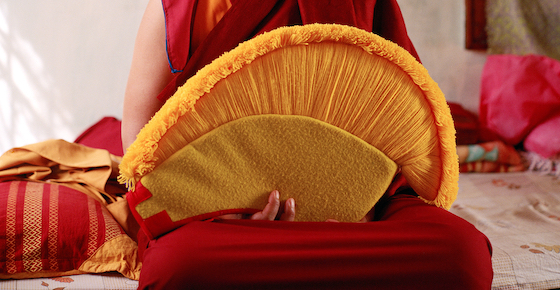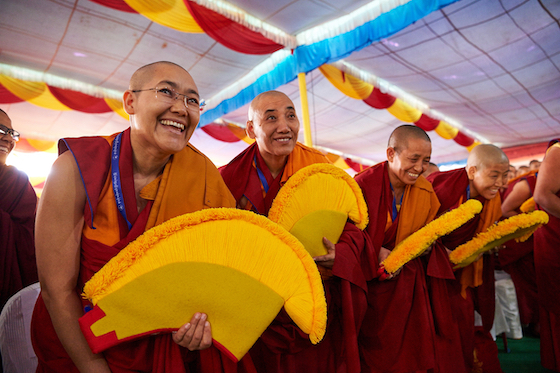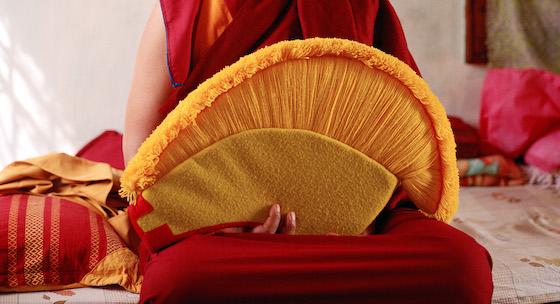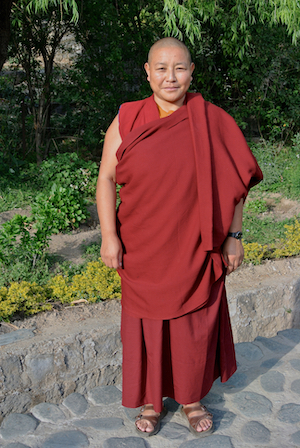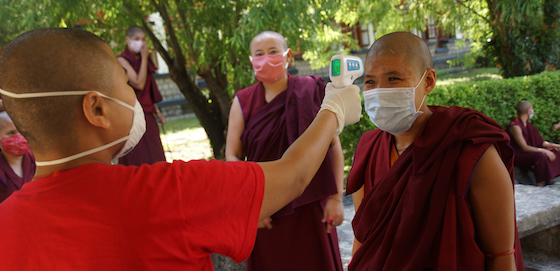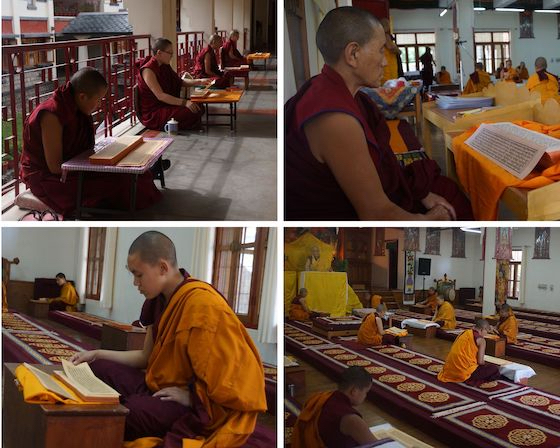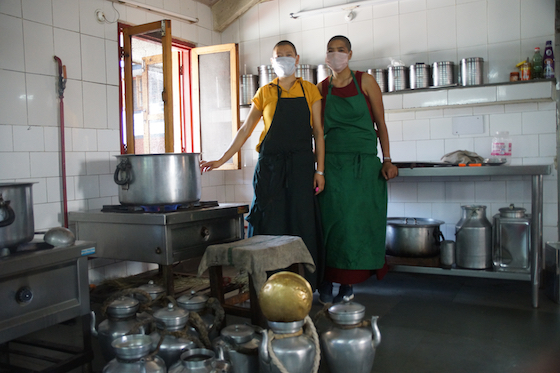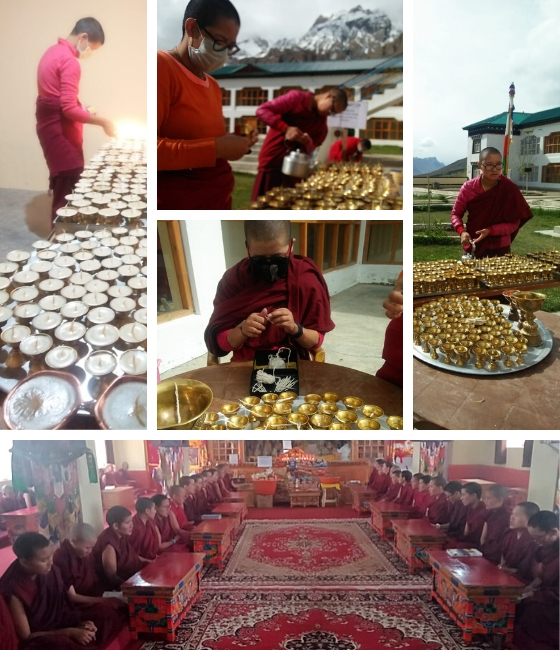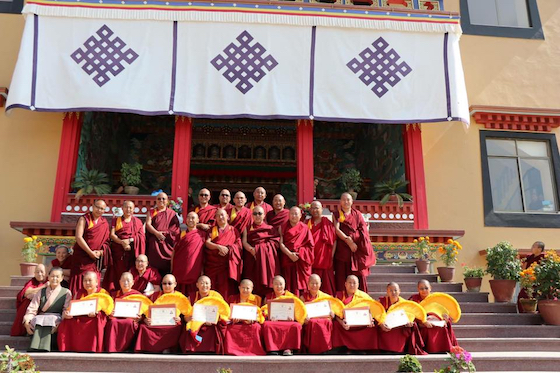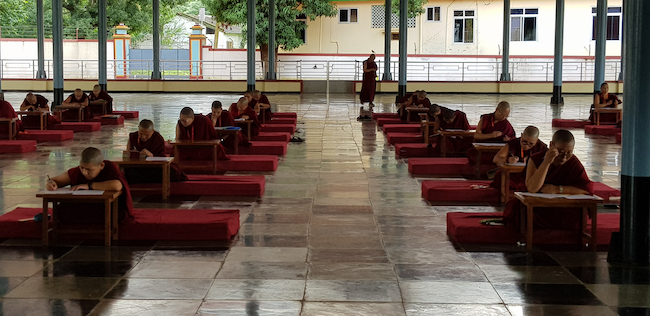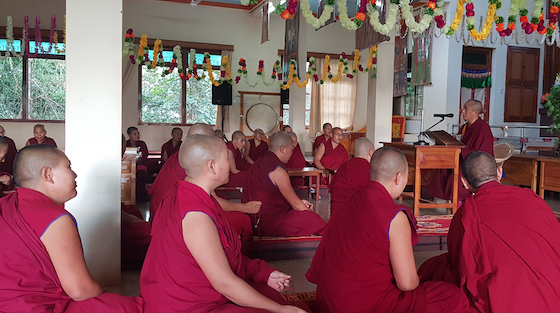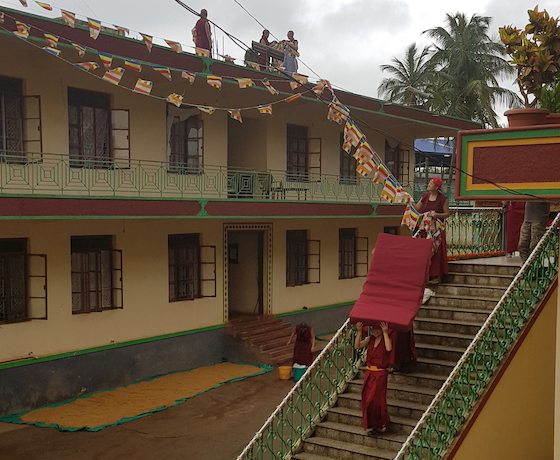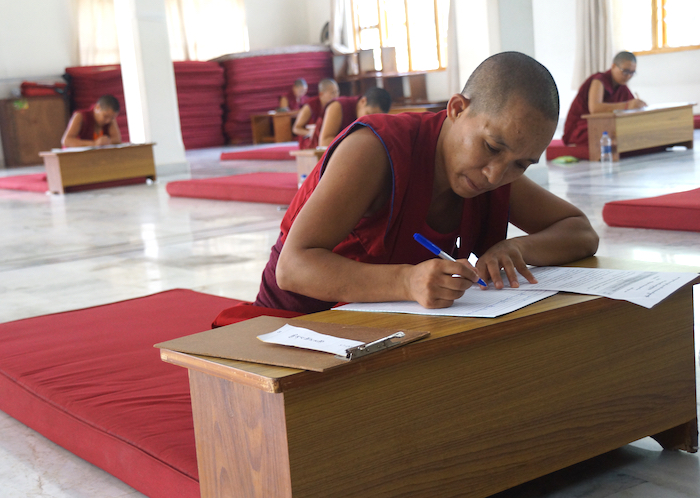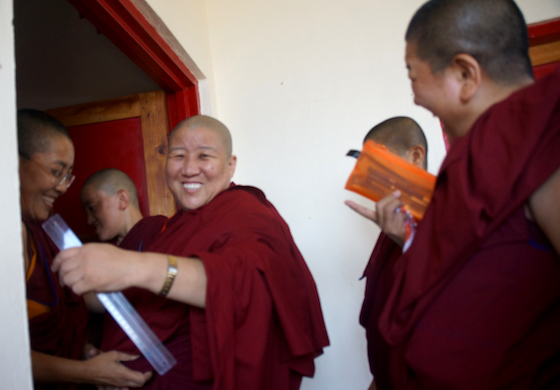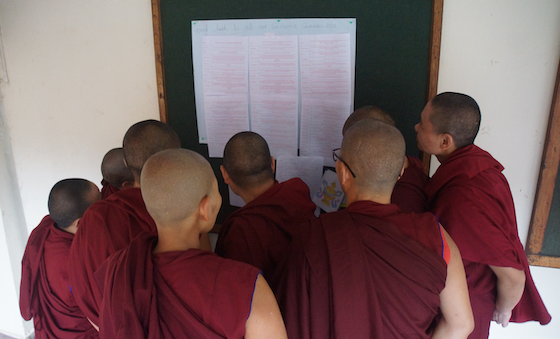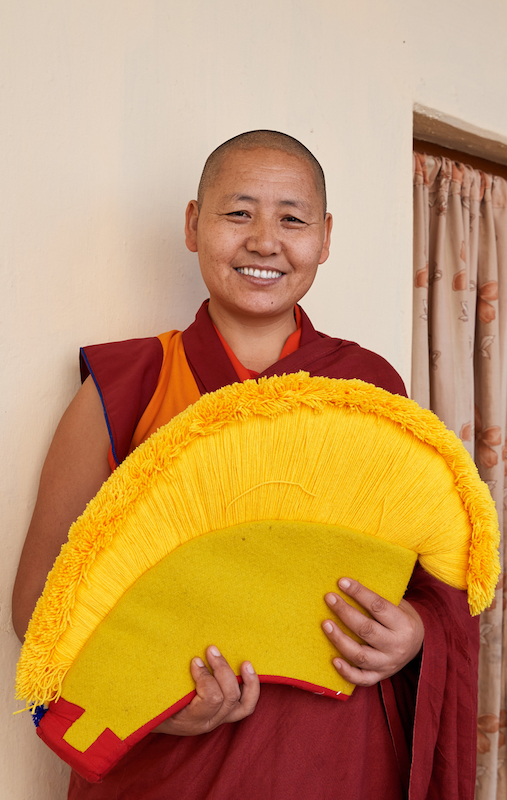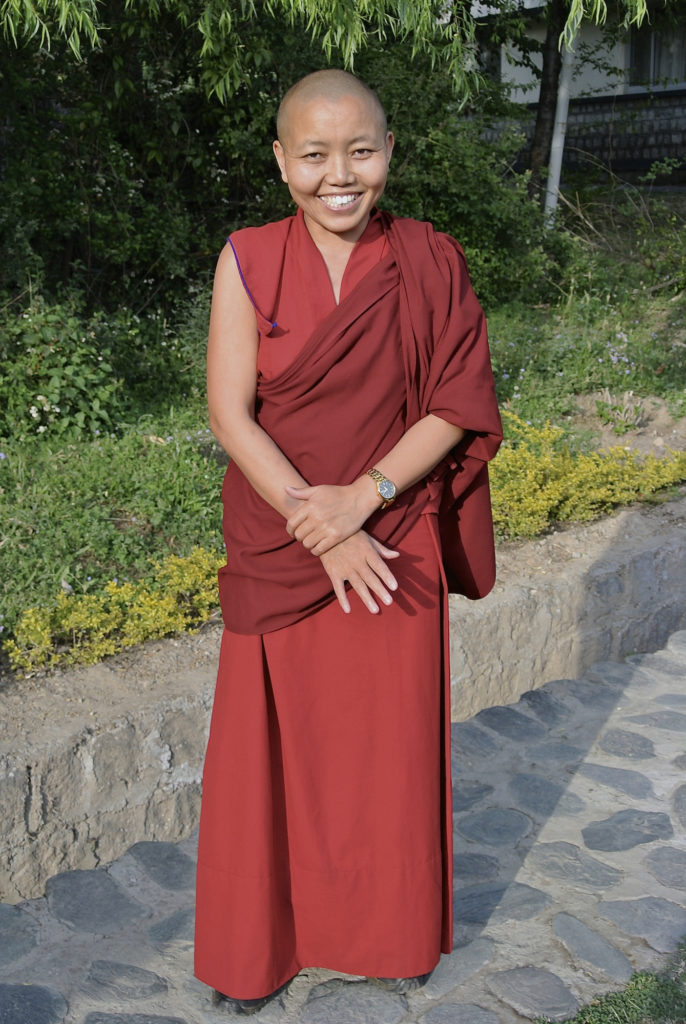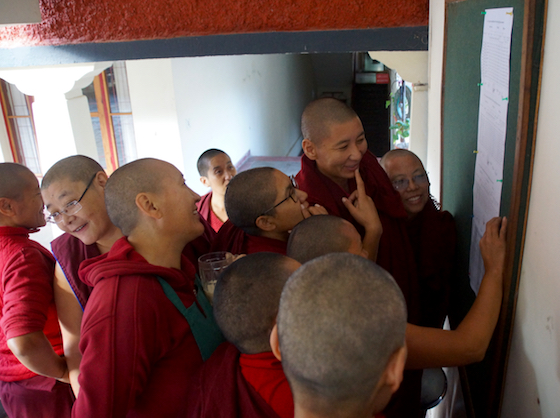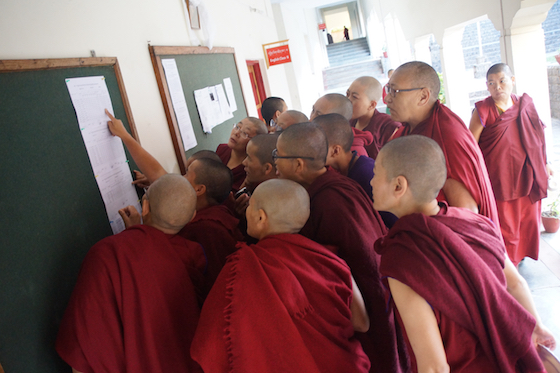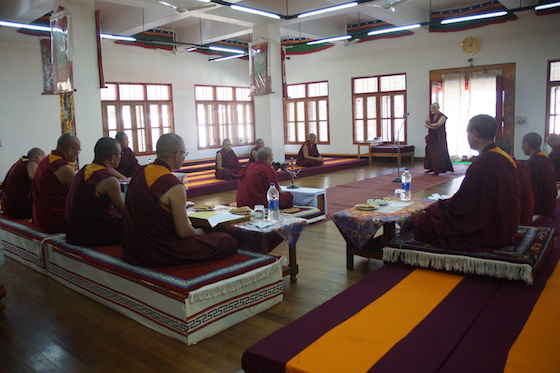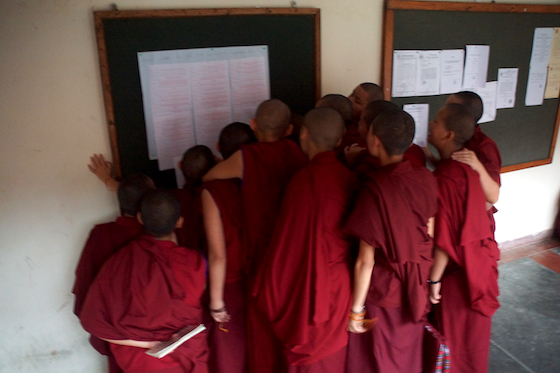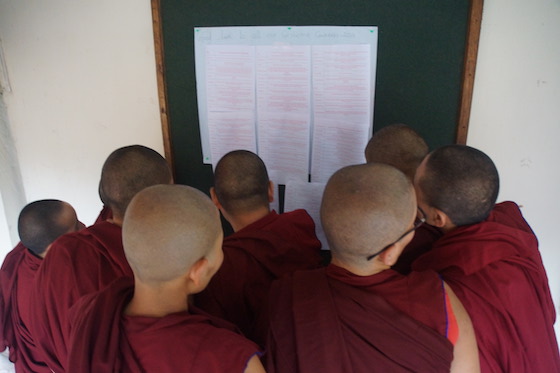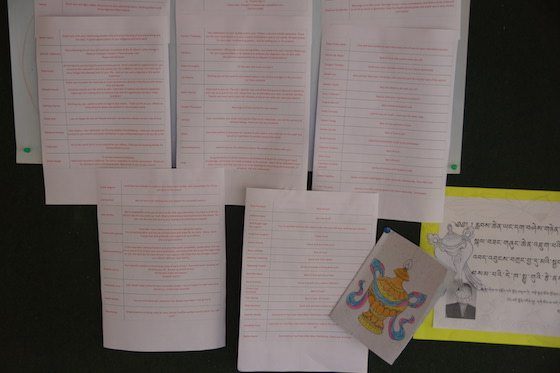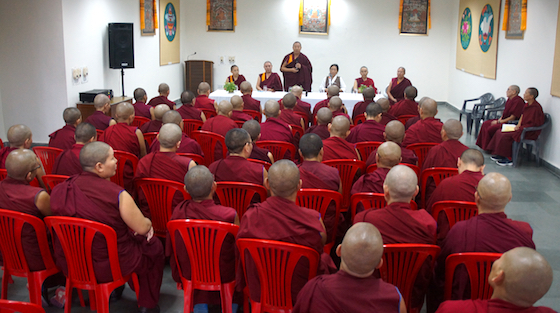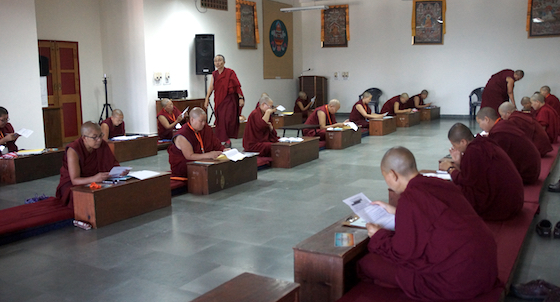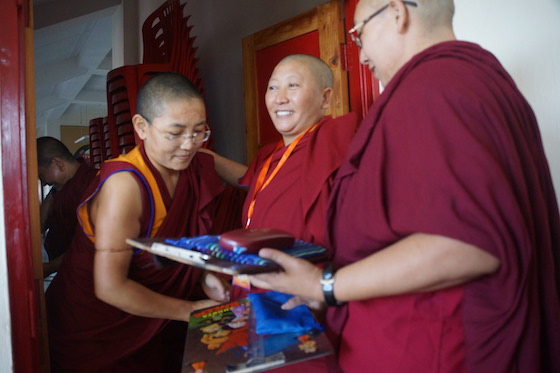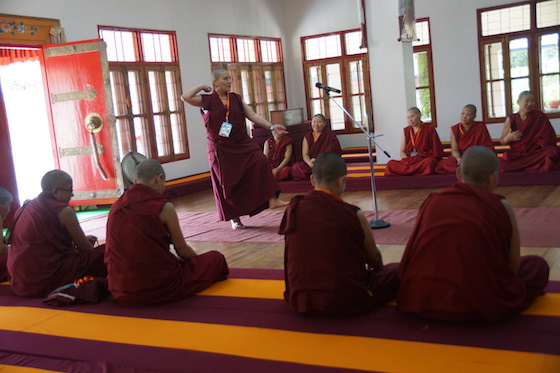We have joyful news! Thanks to wonderful supporters like you, the Geshema Endowment is funded. It is the next step in helping nuns reach the level of education they need to stand as equals with monks.
We are extremely grateful to the 159 donors to the Geshema Endowment, including the Pema Chodron Foundation, the Pierre and Pamela Omidyar Fund of the Silicon Valley Community Foundation, the Frederick Family Foundation, and the Donaldson Charitable Trust.
The Endowment will cover the costs involved in training and qualifying more Geshemas. This includes travel, food, and accommodation for the candidates to attend the exams. It will also cover the cost of administration and materials for the exams. Each new Geshema is also given a set of robes and the yellow hat signifying the holding of the degree.
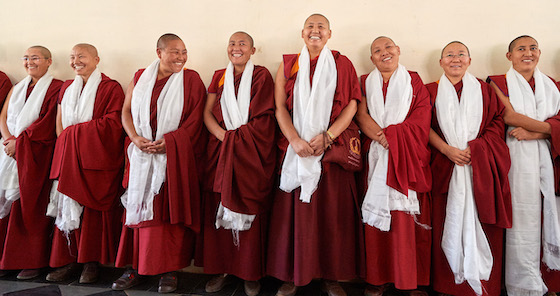
Joy after the first Geshema graduation ceremony in December 2016. Photo courtesy of Olivier Adam.
Geshema Exams Starting August 7th
In 2020 and 2021, the pandemic forced the cancellation of the Geshema exams. We’re happy to tell you that the exams are scheduled to take place this summer at Geden Choeling Nunnery in Dharamsala.
In April, the Geshema Exam Committee sent a letter to all the relevant Tibetan Buddhist nunneries. Nuns must submit their completed forms by May 10th for consideration in this round of exams. Before the exams, the nuns will meet for one month for additional studying. They are to report to Geden Choeling by July 6, 2022, His Holiness the Dalai Lama’s birthday.
We don’t know yet how many nuns will take the exams on August 7th. Eleven nuns passed their 3rd set of exams in 2019 and became eligible to take their final round of exams. Unfortunately, they’ve had to wait two years to take their final set. All being well, this fall the world may have 55 Geshemas!
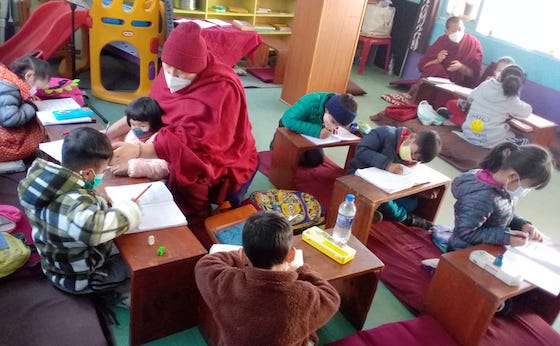
Last winter, Geshemas at Dolma Ling taught children Tibetan reading and writing during the children’s break. It’s one of the many ways the Geshemas are serving the community.
What is the Geshema Degree?
Traditionally, Buddhist nuns have not had the same access to education as monks. One of our goals is to elevate the educational standards and the position of women.
The Geshema degree is the highest level of training in the Gelugpa tradition, equivalent to a doctorate in Tibetan Buddhism.
The Geshema degree was only formally opened to women in 2012 and nuns began taking Geshema exams in 2013. In 2016, 20 Tibetan Buddhist nuns made history when they became the first Tibetan women to earn Geshema degrees.
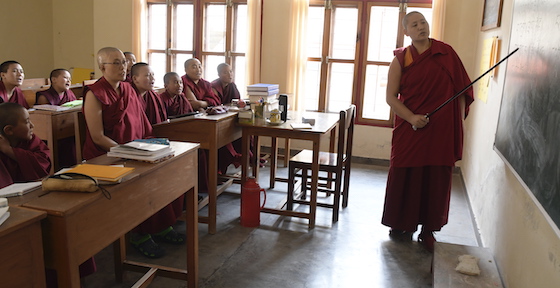
For the first time in the history of Tibetan Buddhism, nuns are assuming various teaching and leadership roles previously not open to women. Geshema Tenzin Kunsel is one of two Geshemas hired in 2019 to teach at Dolma Ling Nunnery and Institute.
The Geshema degree is the same as a Geshe degree; the “ma” indicates that it is awarded to women. To be eligible to take their Geshema exams, nuns must first complete at least 17 years of study.
The rigorous examination process takes four years to complete. Each year, over two weeks, candidates must complete written and debate exams and, in their fourth year, write and defend a thesis.
The Geshemas as Role Models, Leaders, and Teachers
For the first time in the history of Tibetan Buddhism, nuns can assume various leadership roles in their monastic and lay communities reserved for degree holders and hence not previously open to women.
Here is a snapshot of some of the special roles that Geshemas are taking on, particularly at Dolma Ling Nunnery and Institute.
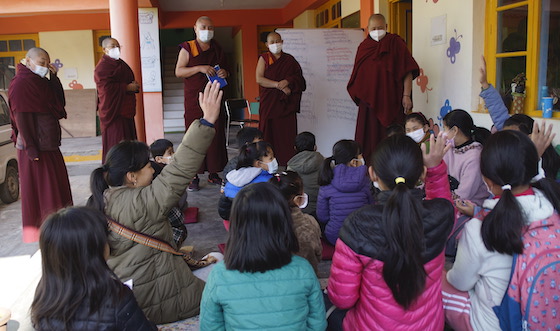
Every winter the local children near Dolma Ling Nunnery have a long holiday. This year the Geshemas wanted to help them improve their Tibetan reading and writing.
Teachers
Until recently, there were no nuns fully qualified to teach Buddhist philosophy. Following further study and exams in Buddhist Tantric Studies, the Geshemas are becoming fully qualified as teachers. In March 2019, two Geshemas made history when they were hired to teach Tibetan Buddhist philosophy at Dolma Ling Nunnery and Institute. For the first time, nuns are being taught these topics by other nuns, rather than by monks. This achievement would not have been possible without the supporters of the Tibetan Nuns Project.
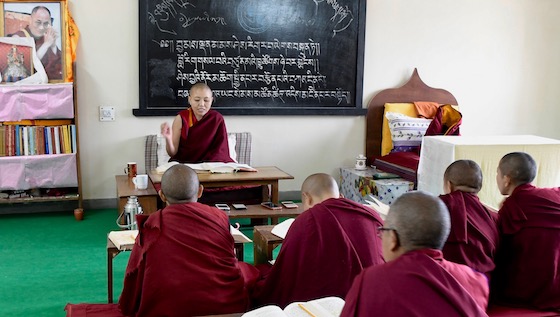
In 2019, two Geshemas made history when they were hired to teach Buddhist philosophy to nuns at Dolma Ling Nunnery and Institute. Photo of GesheDelek Wangmo teaching taken by the Dolma Ling Media Nuns.
“It has been such a pleasure to watch these nuns assume leadership positions in the nunneries and to go where no women have gone before,” said Vicki Robinson, a Tibetan Nuns Project Board member.
Role Models
The Geshemas are also beginning to take on other leadership roles once reserved for men. In 2020, Geshema Delek Wangmo was appointed as an election commissioner for the Tibetan government-in-exile during new parliamentary elections. This was a historic accomplishment for Geshema Delek Wangmo and Tibetan Buddhist nuns in general. Geshema Delek Wangmo graduated with her Geshema degree in 2017 and was one of the first Tibetan Buddhist nuns to pursue higher studies in Tantric Buddhism.

Geshema Delek Wangmo takes the oath of office at the swearing-in ceremony as a election commissioner for the parliamentary elections. Photo: Tenzin Phende/CTA
“Educating women is powerful,” says Rinchen Khando Choegyal, Founding Director and Special Advisor to the Tibetan Nuns Project. “It’s not just about books. It is also about helping nuns acquire the skills they need to run their own institutions and create models for future success and expansion. It’s about enabling the nuns to be teachers in their own right and to take on leadership roles at a critical time in our nation’s history.”
Spiritual Advisors
During the pandemic, Geshemas were asked to provide spiritual advice to Tibetans. In 2020, the Department of Religion and Culture of the Central Tibetan Administration arranged video teachings by Tibetan Buddhist scholars to help Tibetans cope.
Geshema Delek Wangmo gave a video talk in Tibetan on “keeping a peaceful mind during a crisis through the practice of Tibetan Buddhism”. Geshema Tenzin Kunsel gave a video teaching on the Buddhist way to face the pandemic crisis. 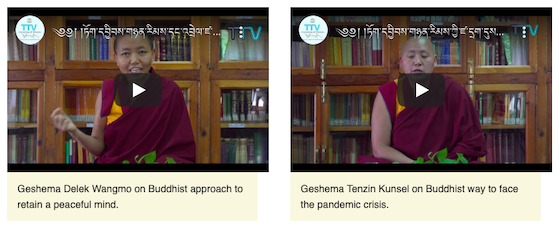
A screenshot from the Central Tibetan Administration website showing videos by Geshema Delek Wangmo and Geshema Tenzin Kunsel who were asked to give spiritual advice to Tibetans during the pandemic.
Scholars
In 2020, five Geshemas received scholarships to participate in a new Tibetan Buddhist philosophy research program organized by the Geluk International Foundation. Thirty Geshes and 5 Geshemas are working on three-year research projects on the five primary topics of Buddhist philosophy studied to earn the Geshe degree.
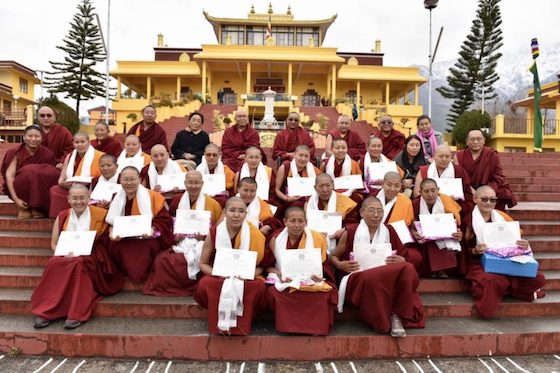
Geshemas holding their certificates in Buddhist Tantric Studies, February 2019. This groundbreaking program began in 2017 and provides these dedicated senior nuns training in tantric theory, rituals, and mind-training techniques used by those engaged in advanced meditation. This level of training is an essential part of studies for Geshes and is a required step enabling them to be fully qualified for advanced leadership roles, such as being an abbot of a monastery.
A Remarkable Achievement
The success of the Geshema program is a testament to the dedication of the nuns. Most of the nuns who arrived as refugees from Tibet in the late 1980s and early 1990s had no education in Tibetan, nor had they been allowed education in their religious heritage. Many were illiterate on arrival and could not even write their names.
“Humanity needs this gender equity if we are to navigate perilous times ahead,” says Steve Wilhelm, a Tibetan Nuns Project board member. “The fact that growing numbers of women are achieving equality with men in the highest levels of Buddhist monasticism, by earning the equivalent of doctorate degrees, is joyous and of enormous importance to the world.”
Thank you for supporting the nuns!
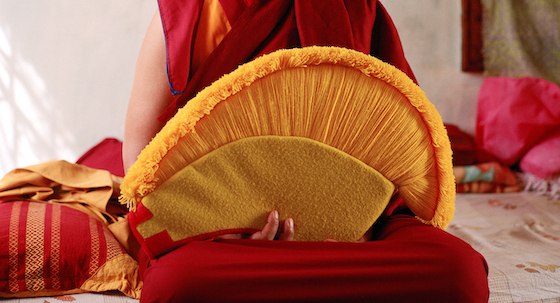
Photo of a Geshema holding the yellow hat that signifies her degree. Detail of photo by Olivier Adam.
P.S. If you don’t mind sharing, post a comment below and tell us why you care about the Geshema degree program. We’d love to share your stories to inspire others to support the nuns.


